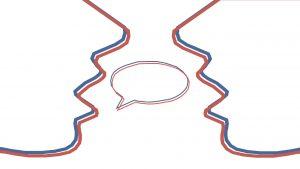By Raneem Alozzi
Nina Kirkegaard tried to be optimistic for the party. Although she couldn’t find someone to go with her, she was determined to have a good time. Her friend in her program, Antoine Plenderleith, was throwing a party for professional communication students and was introducing her to his roommates. Like her, they are francophones. As soon as she walks into the house, the air feels different. The sounds, the people, the mood feel all too familiar. But it wasn’t until she spoke to Plenderleith’s roommates that she realized why.
They spoke in sentences that formed in French yet seamlessly flowed into English half-way through. Their conversation was easy and riddled with jokes that could only have been shared between languages. They both watched the same French shows growing up, and laughed at their dialect differences. They formed an instant bond that no one else in the room had, and Kirkegaard felt whole. It felt like they had known each other forever. But it had only been a few hours.
From an early age, Kirkegaard’s languages always seemed to be at odds with one another. The amount of times she’s moved around the country didn’t help, either. About 23 years ago, Kirkegaard’s family moved to Québec City to live closer to their relatives. Although born and raised in Québec, Kirkegaard’s first language is Spanish, which she acquired from her Bolivian mother.
She went to a French school until she was 10, when she transferred to a private English school in Québec—something Québec law states she is only able to do because of her dad’s English Ontarian background. In Grade 12, her family moved to Ontario, where she also attended an English school.
“I feel more like myself when I’m able to speak both languages”
An identity is partly rooted in language, which means multilingual people can identify themselves in more than one way. Last year 910,400 Canadians reported using an immigrant mother tongue, which is 13 per cent more than in 2011. Nearly 20 per cent of those Canadians speak more than one language at home. French-English bilingualism is also at an all-time high at 18 per cent.
“I’ll struggle sometimes expressing myself because you can’t translate everything that comes to mind,” says Kirkegaard. People can be stuck between the languages they speak, which can leave them feeling isolated. But it can be in this isolation that they can discover who they are in relation to the languages they know, and this can change the way they see and speak to others.
Last year, Kirekegaard worked at a gift shop. Long hours spent greeting and welcoming customers had its ups and downs, but it enabled her to identify people’s languages. A customer walks in, in a hurry. Somehow, Kirkegaard just knows whether to say “Hello” or “Bonjour” to them before they even begin speaking. “It’s just the way they’re dressed, the way they look, the way they carried themselves… It’s just a feeling,” she says with an air of fulfillment. And she was always right.
It was how she met Plenderleith. He answered a question in her lecture, and Kirkegaard knew he was French. “Just being able to connect with someone in a certain way who comes from a similar background was refreshing and instantly deepens the bond between two people,” she says. In contrast, being bilingual around someone who can only speak one language can sometimes create a barrier. “I feel more like myself when I’m able to speak both languages.”
Jaffer Sheyholislami, an associate professor of linguistics and discourse studies at Carleton University says it’s important to realize that by speaking a language, we are doing more than just communicating with someone. We are revealing parts of our identity. We also attribute those different languages to different situations because we are more comfortable using certain languages for different parts of who we are.
Blending two or more languages in one conversation without changing topics is known as code-switching. This can take place between different dialects or forms of a language, but also between two completely different languages resulting in a hybrid, such as Franglais (French and English/Anglais) or Spanglish (Spanish and English).
Sheyholislami says code-switching occurs for many reasons, the most common being when someone can’t think of a word in the language they were primarily speaking. At times, people code-switch as a sign of solidarity, to accommodate people’s needs or even as a sign of respect. “Why people code-switch can be determined by looking into where and who the speakers are,” he says.
But more often than not, code-switching between languages allows an individual to better express and articulate themselves. This also can be done by changing your behaviour or manner of speaking to the people you’re with so they feel more comfortable.
“What you’re really trying to do is to say who you are, in the best way possible, by speaking in the languages you are competent in,” says Sheyholislami. When somebody can listen, understand and appreciate both languages you’re speaking, you can naturally create a stronger connection.

Kira Joulji doesn’t remember much, but she remembers sitting in her classroom in Aleppo, Syria, repeating the words, “Unity. Freedom. Socialism.” She remembers geography classes and having to trace a stencil of the Middle Eastern region, and she remembers being taught Syriac.
Joulji’s religion class was instructed to students in Syriac according to their Mass. This was how she learned to read Syriac, a persecuted language of ethnic Syriacs which was not allowed to be taught in schools. However, because the Syrian government at the time was secular, they couldn’t prevent schools from teaching religion.
Syriac was therefore always taught with the purpose and within the context of biblical and liturgical teachings. Although Joulji cannot fully understand the language, she can read its alphabet.
Arabic came first, and when Joulji was in Grade 4, her mother went to the U.S. on a research grant where Joulji was forced to learn English in the American public school system.
When later immigrating to Canada, Joulji would come to realize how French was integrated within the Ontario school system. Since her father and some of her relatives spoke it, learning the language was natural.
For the fourth-year biomedical engineering student, each language serves a different purpose. “English is more versatile, and so I like using it more, whereas in Arabic there are more structures to jump through… But it feels unnatural to speak to my mom and dad in English, so we almost exclusively speak in Arabic. It feels like putting on the wrong shoe,” she laughs.
While she enjoys the exclusivity of being able to speak Arabic in a predominantly English-speaking country, Joulji finds English to be especially liberating. “English is a freeing language. You don’t have to think of different ways to circumvent the rules. Arabic can be restrictive but there are so many ways to creatively go around the system and create loopholes for yourself. I like that there are nuanced ways to twist words around which you actually can’t do in English,” she says.
But Joulji also recognizes that languages aren’t all spoken the same. While English may feel liberating to people who speak it, it can be very limiting to people who don’t. “I think when you see people struggle and being alienated in a country because they can’t speak its language, just because they don’t have the means or resources to learn and maintain it, it can be very [difficult].”
Speakers of a minority language are always expected to speak English, or any other dominant language, says Sheyholislami. But they might question why they are required to learn English and not the other way around. This is an especially growing trend in post-colonial countries and comes at the cost of rejecting a country’s native language. “As English speakers we’ve become incredibly arrogant. We expect everyone to know English without considering what they might have to offer,” Sheyholislami says.
When reflecting on her ability to speak more than one language, Joulji cannot help but feel grateful for the ability to combine the two languages and create something out of both. It’s conflicting at times, because Arabic remains the language that replaced Syriac; it ostracized her people, and there is a traumatic association that is difficult to separate.
Joulji sees that language is a tool that is beautiful to speak and consume. “Despite the traumatic association it has with the persecution of my people as well as other ethnic minorities, I can let go of that enough to speak the language and to appreciate it for what it is and for the good the culture can reflect in it. It’s enough for me,” she says.
Kirkegaard finished her last year of high school in Guelph. As a Québécoise and francophone, people often assumed Kirkegaard was from France. “I was born and raised in Canada, and I feel very Canadian,” she says. “There were a lot negative responses towards me being from somewhere else and speaking a different language.”
“It feels unnatural to speak to my mom and dad in English, so we almost exclusively speak in Arabic. It feels like putting on the wrong shoe”
Kirkegaard missed Québec and her language the most when people pointed out her slight Québécoise accent and when she could not express herself as deeply as she could in Franglais. It was at this time that she immersed herself in Québécoise music and developed a liking for writing poetry in French.
Although Kirkegaard doesn’t notice her accent, she says others do. In school, when students would point out her accent, it was far from complimentary. She recalls a time when someone was surprised she could speak English so well, and another when someone thought she was faking her accent.
“Tell me why you can pick on my accent when you can’t tell the difference between ‘there’, ‘their’ and ‘they’re’ and English is the only language you know,” says Kirkegaard. Sometimes she catches herself saying things differently than how others pronounce them. “It’s because languages can be difficult to balance,” she continues. Words she sometimes confuses are the French and Spanish “sensible” (meaning “sensitive”) and the English “sensible”, meaning rational.
When we are born, we are capable of making all of the sounds in every language. But as we grow, we lose this ability. According to the Linguistic Society of America, people often cannot pronounce sounds that don’t exist in the language(s) they first learned as children. The older you get, the harder it becomes to learn and pronounce the sounds of a different language. “We all have accents. An accent is just the way we utter sounds in a certain language, and we all utter those sounds differently,” says Sheyholislami. It is when people’s accents deviate from that standard form of the accent that they know that it becomes strange and laughable.
No matter where she went or what language she spoke, someone always had something to say about Kirkegaard. Within her bilingual friend group in Québec, Kirkegaard was set apart by her ability to speak Spanish. Around people who spoke French or Spanish exclusively, Kirkegaard would be immediately singled out as an anglophone. In Guelph, she was the Frenchie. But here, it’s different. Toronto comfortably housed all her languages with plenty of space for more. “Most people don’t care what languages you speak or don’t speak in Toronto. Everyone is always welcoming,” she says.
It was the morning of his Ryerson audition for the performance acting program. The then 19-year-old Plenderleith, Kirkegaard’s friend, only started practicing his Shakespeare monologue in the subway ride from Finch to Dundas Station. The audition would be Plenderleith’s very first time acting in English. “I was so sure I wouldn’t get in, but I did!” he says, laughing at the memory.
Born and raised in Ottawa, Plenderleith struggled in his first year. As someone who had never studied or acted in English, the transition was difficult. Plenderleith distinctively remembers having a professor tell him that if he hadn’t started acting in the language he wants to pursue a career in by the age of 10, then it’ll be very hard to break away from it.
“My prof sat me down and said, ‘Maybe you should consider going to another school’ because I’d only get typecast as a French man in an English environment,” Plenderleith says. It’s hard, but he continued to work on it. But eventually he switched to professional communications.
Plenderleith, a Franco-Ontarian, learned to speak English by the age of five. His first language, French, was the language he spoke the most. Although English was considered to be cooler, using it was often discouraged at school and in some exclusively French neighbourhoods.
“It sucks because sometimes I feel subtly ostracized by the side that I’m more attached to”
When Plenderleith’s family in Québec detect a slight English lilt to his French accent, they switch into English so they can accommodate him. He says it’s something he’s had to deal with his entire life. “I don’t like feeling like I can’t speak just as well. It sucks because sometimes I feel subtly ostracized by the side that I’m more attached to.”
According to the 2011 census, four per cent of Ontarians identified as francophones, and 2.2 per cent declared French to be their home language. Franco-Ontarians are the largest speaking francophone group outside of Québec and the largest minority language group in the province, according to Statistics Canada.
When talking about minority languages, we have to be careful not to view them from the lens of a dominant or Anglo language, said Sheyholislami. “When you look at what the French went through in Canada, and how up until the ‘50s and ‘60s their language was extremely marginalized, you begin to understand their reluctance to use English,” he says.
Like Joulji, Plenderleith is a little more comfortable speaking in English after living in Toronto for some time. But French feels different, he says. “The humour, the swearing, the body language and the manner of speaking all differ in French… There are so many words in French that you don’t have to beat around the bush to say anything. You can say exactly what you want and still get your message across,” he says. When talking about feelings or trying to describe someone’s personality, French is more expressive and allows the speaker to play around with words, explains Plenderleith, as he listed off nine different French words used to describe the English word “extrovert.”

Plenderleith appreciates the openness that comes with French because he can always articulate what he’s thinking, but can’t always think of words to express himself in English. “It can be a bit of a burden being in Toronto sometimes,” says Plenderleith. “But it’s gotten better with time. It gets better by reading, watching sitcoms and listening to the radio and podcasts,” he adds optimistically.
Still, Plenderleith says he’s been lucky enough because Toronto has never felt inaccessible. But it was always the subtle things that reminded him of what he was missing. Little things like hearing people speak in French on the street, meeting people who are familiar with Xavier Dolan or Jean-Marc Vallée (two of the biggest Hollywood directors who are from Québec), when people give hugs when saying goodbye and having his name pronounced properly.
In November of his first year, Plenderleith’s ex-girlfriend had gone home to Kitchener for a weekend but had forgotten to return her keys. Coincidentally, her neighbour was in town and Plenderleith went to return them to her. The neighbour happened to be French. “I hadn’t seen my mom in a while and I hadn’t been around many French people so I went there and we were just having nice small talk,” he says.
Before he left, the neighbour tells Plenderleith it was nice to meet him. She says his name like “Aut-wan”, with a deep “au” sound and a soft “wa.” Most English speakers will pronounce his name like “Ant-won”, pronouncing the first “n” which is meant to be silent. “Hearing my name pronounced properly for the first time in so long, it blew me away. It felt like home.”













Leave a Reply